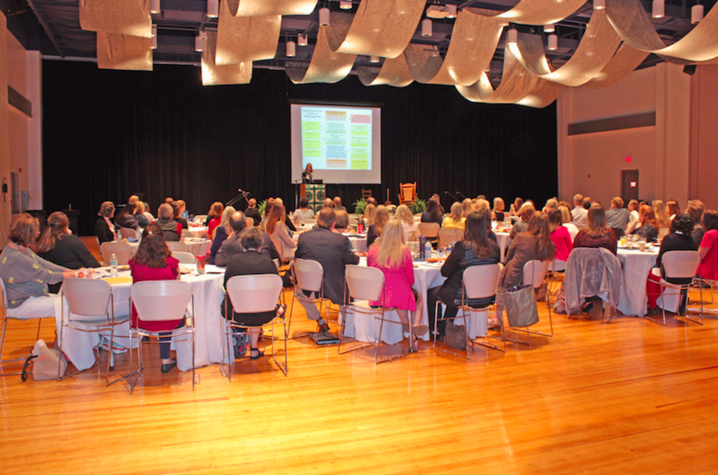Third Annual Appalachian Research Day Shares Results of Health Studies

LEXINGTON, Ky. (June 1, 2017) – The Third Annual Appalachian Research Day was held May 24 in Hazard, Ky., hosted by the University of Kentucky Center of Excellence in Rural Health (CERH). The event invites researchers and community members to “come sit on the porch” and share research findings with the local communities involved in the studies.
Rural Appalachian communities experience some of the most severe health disparities in the nation, and community-based research is an effective method to identify problems and develop collaborative, effective solutions.
This type of engaged research begins at the local level, built upon the foundation of relationships with individuals, neighborhoods, and groups who have common questions and concerns. And for many researchers at UK and partner institutions, the CERH is an indispensable resource for conducting community-based research. It provides local connections, infrastructure, dedicated research personnel and a team of community health workers, called Kentucky Homeplace, who engage participants and gather data.
“Appalachian Research Day is an important and exciting day for us each year at the UK Center of Excellence in Rural Health. It is an opportunity for us to provide research updates to our community about relevant issues that affect all of us," said Fran Feltner, director of the UK CERH "Appalachian Research Day is also an opportunity for dialogue with community members to discuss what we can come up with together to better our lives in Appalachia.”
This year’s event, which was held at Hazard Community and Technical College to accommodate the growing number of participants, included Hazard Mayor Jimmy Lindon and Perry County Judge-Executive Scott Alexander, who both made remarks during lunch. Also present were Andrea Begley, field office representative for U.S. Congressman Hal Rogers, and Jenna Meyer of the U.S. Centers for Disease Control and Prevention, who is on special assignment in Eastern Kentucky for the Shaping Our Appalachian Region (SOAR) initiative.
Featured presentations reported findings from five health research studies conducted with Appalachian communities:
- Dr. Susanne Arnold, associate director of clinical translation at the University of Kentucky Markey Cancer Center, presented her research examining the interrelated causes of lung cancer, and how to combat them. She reported that lung cancer risk has environmental, physical and molecular causes, some of which can be prevented.
- Nancy Schoenberg, Ph.D., associate dean for research of the UK College of Public Health and Marion Pearsall Professor of Behavioral Science in the UK College of Medicine, studies the health of grandfamilies in Appalachia. Her recent study with rural adults over age 65 found that half of them struggled to make ends meet and experienced many physical health problems.
- Dr. Judith Feinberg, professor in the Department of Behavioral Medicine & Psychiatry at West Virginia University School of Medicine, studies behavioral medicine and psychiatry. She presented her research on addiction as a chronic, relapsing brain disease, reporting that syringe services programs (SSPs) operate under the principles of harm reduction and have been shown to offer significant protection for people injecting drugs, including lower risk of HIV infection.
- Jarod T. Giger, Ph.D., of the UK colleges of social work, medicine, and public health, studies child well-being in Eastern Kentucky. In a recent study, he found that children in three Eastern Kentucky counties reported relatively high amounts of electronic health literacy but low amounts of overall life satisfaction and affective and psychological wellbeing.
- Omopé Carter Daboiku is an Appalachian Foodways Scholar who leads workshops that operate on an emotional level to help participants understand that adapting family recipes to healthier versions doesn't disrespect one’s ancestors. Her work incorporates nostalgic attachment to food memories, with the understanding that the relationships these memories invoke can make it difficult to prepare healthier food.
This year’s Appalachian Research Day also featured 18 poster presentations about community-based health research in the area. The following researchers received prizes for poster presentations:
- 1st Place: Suzanne Pilan, UK College of Nursing; “Serum vitamin D levels in older adults who fall and sustain a fracture: Retrospective Chart Review”
- 2nd Place: Jamie Studts, Department of Behavioral Science, UK College of Medicine; “Development of the Kentucky LEADS Collaborative Lung Cancer Survivorship Care Program”
- 3rd Place (tie): Shari Kidwell, Department of Psychology, Morehead State University; “Interpersonal and Intergenerational Trauma Amongst Eastern Kentucky Mothers: Connections with Parenting Sensitivity and Implications for Early Intervention"
- 3rd Place (tie): Erin Chiswell, UK College of Nursing; “A Patient and Provider Education Program Decreases Antibiotic Overuse in Respiratory Tract Infections in a Rural Primary Care Population”
The event received support from the UK Center for Clinical and Translational Science, which partners with the CERH for a range of community-engaged health research and programming in Appalachia, including in the Community Leadership Institute of Kentucky, which provides training and funding to local leaders who are working to improve health.
In Eastern Kentucky and Appalachia, the CERH has enabled community-based studies since 1990, when it was founded to address health disparities and provider shortages through education, service and research. The Center accomplishes this through health professional education, health policy research, health care service and community engagement. A key component of the center is the Kentucky Homeplace network of community health workers, who help clients address health issues related to lifestyle choices, environmental factors, inadequate health insurance, and general lack of understanding of the healthcare system. The Center also serves as the federally-designated Kentucky Office of Rural Health (KORH). This program provides a framework for linking small rural communities with local, state and federal resources while working toward long-term solutions to rural health issues. The CERH also houses the UK North Fork Valley Community Health Center, the host clinic for the East Kentucky Family Medicine Residency Program.




